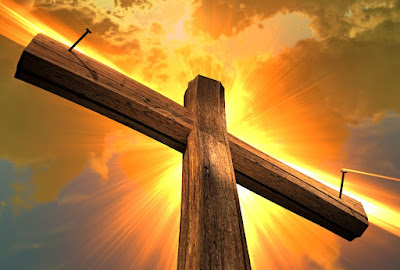ECCE LIGNUM CRUCIS (Behold the Wood of the Cross).
September 14, 2021
Feast of the Exaltation of the Holy Cross.
READINGS: Nm 21:4b-9; Ps 78:1bc-2, 34-35, 36-37, 38; Phil2:6-11; Jn 3:13-17.
“And just as Moses lifted up the serpent in the desert, so
must the Son of Man be lifted up, so that everyone who believes in him may have
eternal life.” (Jn 3:14)
An Italian proverb says: “Self-exaltation is the fool’s
paradise.” And a Filipino proverb adds: “There’s no glory without sacrifice.”
There is no glory without suffering. That is the beautiful
message of the Feast of the Exaltation of the Cross. Jesus was raised into
glory after being raised high on the cross. The instrument of his suffering
became the highway to his exaltation at the right hand of the Father in Heaven.
Many people find suffering unacceptable and the crosses in
life, unbearable. The Lord, today, tells us that we should not be afraid to
suffer, and most especially to suffer for righteousness’ sake. For, all our
hardships will be rewarded and our lives crowned with glory.
About the Feast of the Exaltation of the cross, this is what
tradition says: "The feast was celebrated in Rome before the end of the
7th century. Its purpose is to commemorate the recovering of that portion of
the Holy Cross which was preserved at Jerusalem, and which had fallen into the
hands of the Persians. Emperor Heraclius recovered this precious relic and
brought it back to Jerusalem on 3 May 629."
One thing is important in this piece of history, the central
element, the Cross. It is all about paying reverence and honor to a piece of
the wood that bore the Holy Body of our Lord and won for us salvation. In the
liturgy of Good Friday, here is what we sing: Ecce lignum Crucis (Behold the
wood of the Cross). The priest sing, "Behold the wood of the Cross, on
which hung the salvation of the world." And we all respond, "Come,
let us adore." We adore in the material of the wood the salvation of
mankind and the whole creation.
The word of God emphasizes today this aspect of the Cross as
means of salvation. In the desert, to the sinful children of Israel, after they
complained about the Manna and against Moses and God, the Lord punished them
with the saraph serpents, which bit the people so that many of them died. When
they plead for his mercy, the Lord ordered Moses to erect a bronze serpent and
hang it on a pole. It became the instrument of expiation and salvation for all
who were bitten by the Saraph serpent.
Through this sign, we have a prefiguration of what Jesus
will do for our salvation from sin, his death on the cross. In his argument
with Nicodemus, the Lord says is clearly: “And just as Moses lifted up the
serpent in the desert, so must the Son of Man be lifted up, so that everyone
who believes in him may have eternal life.”
The Cross on which Jesus was exalted, the sufferings he
resiliently supported were the expression of God’s greatest love. “For God so
loved the world that he gave his only Son…” The cross of Christ and his love
ask one thing in return from us, our faith. We are urged to believe in the Son
of God who suffered for our salvation and life. And the adds, “For God did not
send his Son into the world to condemn the world, but that the world might be
saved through him.”
On the wood of the Cross, the Lord gave the greatest lesson
on humility. He lowered himself, from his glorious throne in heaven, to share
in our humanity and died in the most ignominious way. Let us not miss in mind
this reality. At the time of Jesus, under the Roman dominion, the cross was an
instrument of capital punishment, just like we may think of the execution by
electrocution, performed using an electric chair, originating in the United
States, or the beheading or the shelling practiced by the Taliban. With Jesus
dying on it, however, this instrument of torture and death that was the Cross
has turned to become a “Giver of Life”. The humiliation has been turned into
glory. Jesus, by his redemptive suffering on the Cross and his obedience, “God
greatly exalted him and bestowed on him the name that is above every name.”
The Cross of Christ is a sign and the key to the Kingdom of God. Here is what the Catechism of the Catholic Church says: “The coming of God's kingdom means the defeat of Satan's: "If it is by the Spirit of God that I cast out demons, then the kingdom of God has come upon you." Jesus' exorcisms free some individuals from the domination of demons. They anticipate Jesus' great victory over "the ruler of this world". The kingdom of God will be definitively established through Christ's cross: "God reigned from the wood.” CCC.550. So, what we celebrate today is that reign of God, the manifest sign of his presence and his kingdom in our midst. For us Christians, the Cross means a lot. It means humility, victory, life, salvation, and glory. Jesus’ exaltation on the wood of the cross teaches us that real glory comes only from humility and self-sacrifice out of love for others. The Cross sings the hymn of the victory of life over death through the power of love.





Comments
Post a Comment